

Tao Te Ching
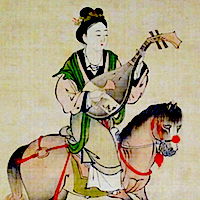
Periodo edo, kosumi morihage, wang zhaojun
Western Han (206 BCE – 9 CE)
Qin Shih Huandi’s approach—while highly successful in warfare—became disastrous in peace. His harsh extremism quickly dissolved into chaos only relieved when the peasant Gaozu, Liu Bang (汉高祖) seized the throne, established the Han dynasty, reduced taxes, and promoted Confucianism. His 7th successor, Emperor Wu, became one of the greatest emperors in Chinese history, ruled for 54 years, vastly expanded Chinese territory making it one of the world’s most powerful countries for the first time, experimented with many socialist reforms, and formed a synthesis of Confucian, Daoist, and Legalist thought. During the Han dynasty, trade expanded, poetry proliferated, pottery became beautiful, scholarship bloomed, and China reached its highest level of prosperity. However, droughts, floods, weak rulers, and rebellions weakened the dynasty and it fell victim to Tartar invasions.
Sages (20)

Anonymous
-800 to present
Freedom from the narrow boxes defined by personal history
Anonymous (5000 BCE - )
Most of us, most of the time stay busy trying to impress people looking for approval, praise and fame. This enslaves and sells our souls to the tyrants of public opinion, the status quo, and to external personal whim. As an antidote to this, the cloak of anonymity opens wide doors of personal expression, creativity, and innovation. In ancient times, perhaps less personal ego fostered this approach, perhaps names were just eroded away by time as is surely the case with many of the quotations that comes to us through the annals of history, perhaps people needed to avoid religious or political persecution. The venerable tradition of using pseudonyms exemplifies both the need and benefit of freeing ourselves from the narrow boxes defined by our personal histories.
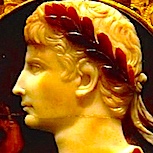
Augustus (Caesar)
63 BCE – 14 CE
Founder, first Emperor, and architect of the greatest empire of ancient history, the Pax Romana golden age, the longest period of prosperity in history, a regime that lasted almost 1500 years; Augustus became heir to Julius Caesar when 18 and leader of the western world at 31. Living simply like a philosopher instead of a king, he began with his world in corrupted chaos and established a balanced blend of order and freedom. He made good laws, helped both rich and poor, personally oversaw extensive infrastructure, 250,000 miles of roads, created police, fire-fighting, and courier services. He ruled Rome for 40 years and yet died believing he was a complete failure.
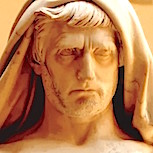
Cato (the Younger, Marcus Porcius Cato Uticensis)
95 – 46 BCE
Incorruptible politician, insightful Stoic philosopher, long-time stubborn rival and opponent to Julius Caesar’s despotism; Cato was one of the most active defenders of the Roman Republic and his suicide was considered by later Romans a great psychological and cultural victory over Caesar's tyranny. Hero in Virgil’s Aeneid, mentioned in the first paragraph of Moby Dick, immortalized through the ages in plays, novels, poetry, opera, and television; Dante described him in Purgatorio as a “saved soul” who was “worthy of so much reverence that never a son owed his father more.” Immune to bribes and corruption, he became a symbol for individual liberty over governmental tyranny; democracy over monarchy, reason over belief and superstition; Cato greatly influenced George Washington and the founding of the US government.
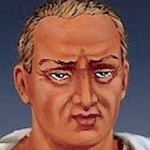
Cicero
106 – 43 BCE
One of Rome's greatest orators and writers with an immense influence on European languages greater than any other writer in history, Cicero introduced Greek philosophy and as a ground-breaking translator invented new Latin terms for philosophical concepts. His rediscovery sparked both the 14th Renaissance and the 18th century Enlightenment. Refusing an invitation for highest office from Julius Caesar, he championed democracy, fought against dictatorship and for these reasons was killed by Mark Antony. He inspired both the American and French Revolutions as well as everything from Jefferson’s writing of the Declaration of Independence to Copernicus placing the sun rather than the earth at the center of our solar system.
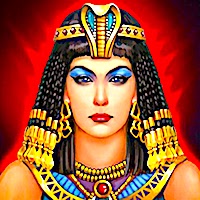
Cleopatra Κλεοπᾰ́τρᾱ Φιλοπάτωρ (Cleopatra VII Thea Philopator )
69 – 30 BCE
History’s most famous femme fatale
Egyptian pharaoh, naval commander, linguist, diplomat, medical author, and one of history’s most famous femme fatales; Cleopatra was actually known to have had only two lovers, Julius Caesar and Mark Antony. These were the two most powerful leaders of the time and consequently the two most likely to save her struggling, precarious dynasty. This strategy came close but failed and after her death, Egypt became a Roman province. Cicero knew her personally and—along with Virgil, Horace, and Ovid—described her negatively. This, at least in part, was a result of history being written by the victors and Egyptian sources like the Libyka give her more praise and respect. Even Plutarch was more positive and described her influence as based more on personality and charm more than just beauty. A descendant Ptolemy I, a Macedonian Greek general and companion of Alexander the Great, her story comes down to us today through the perspectives of luminaries including Chaucer, Shakespeare, George Bernard Shaw, Chinese scholar Yan Fu, Elizabeth Taylor, 43 movies, 200+ plays and novels, 45 operas, and 5 ballets.
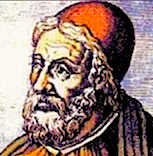
Eratosthenes ρατοσθένης (of Cyrene)
276 – 195 BCE
Chief librarian of Alexandria, student of the best teachers of his age: the Stoic founder Zeno, the first serious academic Stoic Arcesilaus, the famous poet Calimachus, and grammarian Lysanias; Eratosthenes invented geography (his terms still used today), made the first Western map of the world including parallels and meridians, calculated the circumference of the Earth and the tilt of its axis for the first time, invented leap day, accurately measured the distance from the Sun to the Earth, and founded “scientific chronology.” The first geographer to mention the Chinese, he criticized the Greek chauvinism of describing foreigners as barbarians and recommended judging people as individuals instead of as members of religious, cultural, or national groups.
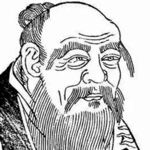
Heshang Gong 河上公 (Ho-shang Kung or "Riverside Sage”)
202 – 157 BCE
One of the two most famous commentators on the Tao Te Ching, Heshang Gong was one of the first to emphasize Taoist yoga and meditation practices. Not only meant to explain, he stressed the practical implications and ways Lao Tzu’s wisdom can guide and enrich everyday life. Almost every commentary since has used his as a foundation. He merged Lao Tzu’s political and ethical teachings into a guide for both individuals and emperors.

Horace
65 – 8 BCE
One of the most famous Roman poets during his time and still considered one of the best from any time, Horace also became a spokesman for the Caesars during Rome’s change from Republic to Empire. A continuing aspect of Western education until our own times, he influenced Milton, Byron, Keats, Wordsworth, Omar Khayyam, Kipling, Robert Frost and most Western poets. The insight and wisdom condensed in his famous phrases like “carpe diem“ vividly live in our own culture more than 2000 years after his time.

Jesus
3 BCE – 30 CE
Descriptions of Jesus were written in New Testament documents between 70 and 150 CE, a time of many different Christian books, many different gospels. In 170 CE church leaders first decided which books were “official,” which weren’t. More were added later and the modern version finalized at The Council of Hippo in 393. Some historians believe this selection was at least partially based on politics, patriarchy, and power. In any case, many of the banned and burned books known as Gnostic Gospels seem to have more wisdom and understanding, more connection to the non-thought lineage than the officially recognized texts. Many of the quotes here come from one of these, The Gospel of Thomas discovered in 1945.
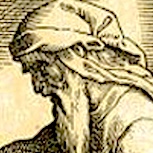
Koheleth
c. 330–180 BCE
Author of the most mystical, the most in harmony with the non-thought lineage part of the Bible, Koheleth anonymously wrote Ecclesiastes, part of the Hebrew Bible as well as one of the “canonical Wisdom Books” recognized by most Christian denominations. It focuses on the meaning of life, the best way to live, the futility of materialism and wisdom as the highest value. Thomas Wolfe called it “the noblest, the wisest, and the most powerful expression of man's life upon this earth—and also the highest flower of poetry, eloquence, and truth.” Koheleth himself remained anonymous and obscure, not taking credit for this great work.
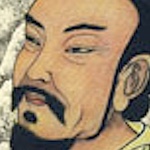
Liú Ān 劉安 (Huainanzi)
c. 179–122 BCE
Grandson of the Han Dynasty founding emperor and known as both an enlightened immortal and by his detractors as a rebel, Liu An sponsored “The Eight Immortals of Huainan” who together with him wrote the Huainanzi, a famous text that along with the works of Laozi and Zhuangzi is considered a cornerstone of Daoist philosophy. It describes how to perfect the best socio-political order and is still used as a handbook on how to train enlightened leaders. Also known as a great poet, Liu An’s fame includes being the first to record the famous Taoist Farmer Story, the first to experiment with hot air balloons as well as inventing tofu and soy milk.
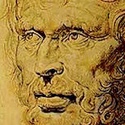
Lucretius (Titus Carus)
99 – 55 BCE
The greatest Western philosophical poet, a complete evolutionist, writer of the “loftiest poetry that any age has known” and the “most marvelous performance in all antique literature” (Durant); Lucretius described religion, the universe, and medicine from a rational point of view without superstition, faith, or dogma. An Epicurean with allegiance to only Venus and the power of love, he left behind all other gods and proposed a scientific understanding of the world including atomic theory and evolution. A huge influence on ancient times, people like Virgil and Horace; he also inspired Enlightenment era people, humanism, Thomas Jefferson and modern psychology.

Mary of Magdala
3 BCE – 120 CE
Called the ”Apostle to the Apostles" by the 3rd century theologian Hippolytus, the story of Mary of Magdala resembles that of Mahākāśyapa – the only one of the Buddha’s disciples to understand the Flower Sermon. In the Gospel of Mary, she was the only disciple to understand Jesus’ inner teachings about basic goodness, discovering the truth within ourselves rather than an external authority, the dangers of following charismatic leaders and sets of rules and laws rather than the wisdom within.
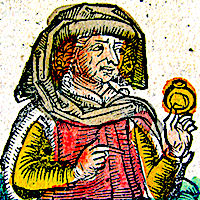
Ovid oʊvɪd (Publius Ovidius Naso)
43 BCE – 18 CE
Great poet and major influence on the Renaissance, Humanism, and world literature
Roman poet, inspiration for Renaissance humanism, consummate love elegist, and a tremendous influence on both Western literature and art; Ovid was staggeringly popular during his own time, during the Middle Ages, during the Renaissance, and still in our own time today. Fashioning himself as a love doctor, he wrote a 3-volume treatise called The Art of Love complete with instructional images and poetry about oral sex pleasure. It begins with teaching men how to best find a lover, seduce them, and later hide affairs. It continues with advice for women on how to avoid the traps and deceptions he has taught men. This also became immensely popular but his popularity didn’t serve him well politically. Emperor Augustus exiled him to a remote, harsh location where his friends avoided him and he remained until he died 9 years later.
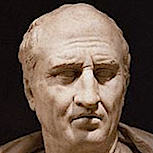
Philodemus Φιλόδημος (of Gadara)
110 – 35 BCE
Innovative philosopher-poet, student of Epicures and Zeno, first generation Epicurean, praised by Cicero, and a big influence on Horace; Philodemus was originally most well known for his poetry. However since 1738 when the ancient papyrus scrolls of Herculaneum were discovered under lava flows from Mt. Vesuvius that also destroyed Pompeii and with the help of x-rays and computers in recent years, his influence was discovered to extend to music, history, ethics and theology.
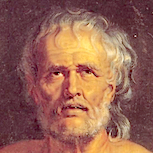
Seneca ˈsɛnɪkə (Lucius Annaeus)
4 BCE – 65 CE
Stoic philosopher, polititian, author, and first great Western thinker to describe the importance of relationship gratitude; Seneca taught and advised emperor Nero and for his efforts was forced to commit suicide. Humanist saint still popular and influential today, he influenced Dante, Chaucer, Petrarch, Erasmus, John Calvin, Shakespeare, Montaigne who was considered a "French Seneca,” and Joseph Hall considered “an English Seneca." Slandered by contemporaries, historians, and modern novelists as a sycophant to Nero and hypocrite, he did compromise to political expediency but also balanced faith and freedom promoting a simple and accepting lifestyle beyond anger, just politics, and global citizenship.
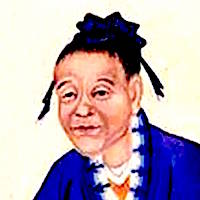
Sima Qian 司馬遷 (Ssu-ma Ch'ien)
145 – 86 BCE
Father of Chinese historians
Father of Chinese historians, Court Astrologer, and and for centuries considered author of the greatest history book ever written; Sima Qian—although imprisoned, castrated, and enslaved—managed to write a monumental and innovative history of China including a series of biographies that went back more than 2000 years. His writings and writing style had a deep influence on Chinese, Korean, Japanese, and Vietnamese cultures. Sorting through myth and imagination, he went beyond the tradition of only writing about the emperors and generals, used more than 75 books to cross-check for accuracy, refused to include information he couldn’t verify, and traveled extensively interviewing people about their personal experience of events. He wrote the earliest known biography of Lao Tzu.
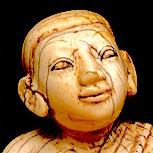
Upagupta ရှင်ဥပဂုတ္တ (Shin Upagutta)
c. 3rd century BCE
4th Zen Patriarch, disciple of the Buddha’s close attendant Ananda’s regent, the spiritual teacher of Ashoka who spread Buddhism from a very small community into the greater world; Upagupta is still remembered and venerated in many South East Asian countries, Bangladesh, and with a special, high status in Burma that celebrates a major festival in his honor each year. Immortalized in a poem by Rabindranath Tagore, he refuses the advances of his city’s most famous enchantress when she’s young and beautiful only to nurse and stay with her when she’s suffering from a disfiguring disease.
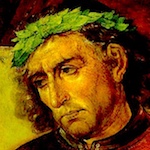
Virgil (Publius Vergilius Maro)
70 – 19 BCE
“The most lovable of Romans” and its greatest poet, advocate/inspiration/teacher for small farmers, Dante's guide through hell and purgatory, considered a great magician, seer, and saint as well as the embodiment of human knowledge and experience; Virgil began life as a poor farmer and once had to swim for his life to escape soldiers. Given patronage by Augustus he wrote the Aeneid that became the Roman national epic and standard text for school curricula after Augustus refused Virgil’s dying wish to have it burned. For hundreds of years his poems were opened at random as an oracle for insight into uncertainty and to solve problems.
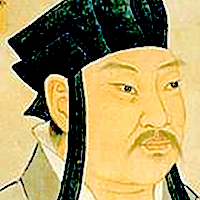
Yang Xiong 揚雄
53 BCE – 18 CE
"Confucius from the western parts,” poet, philosopher, I Ching scholar, and politician; Yang Xiong became one of the most famous people of the entire Han dynasty. His most well-known and influential book was Exemplary Sayings (法言) which includes him in our lineage of aphorists. He took a middle-ground approach between Xunzi and Mencius describing basic human nature as neither basic goodness or basic badness characterizing it as a complex combination.
Chinese Eras
Xia Dynasty 夏 (2100 – 1600 BCE)
Shang Dynasty 殷代 (1600 – 1046 BCE)
Western Zhou 西周 (1046 – 771 BCE)
Eastern Zhou 東周 (770 – 256 BCE)
Spring and Autumn period 春秋时代 (770 – 476 BCE)
Warring States period 春秋时代 (476 – 221 BCE)
Qin Dynasty 秦朝 (221 – 206 BCE)
Three Kingdoms 三國時代 (220 – 280 CE)
Southern and Northern 南北朝 (420 – 589 CE)
Tang Dynasty 唐朝 (618 – 907 CE)
5 Dynasties 10 Kingdoms (907 – 960 CE)
5 Kingdom of Dali 大理国 (937 – 1253 CE)
Western Xia 西夏 (1038 – 1227 CE)
Southern Song (1127 – 1279 CE)
Comments (0)